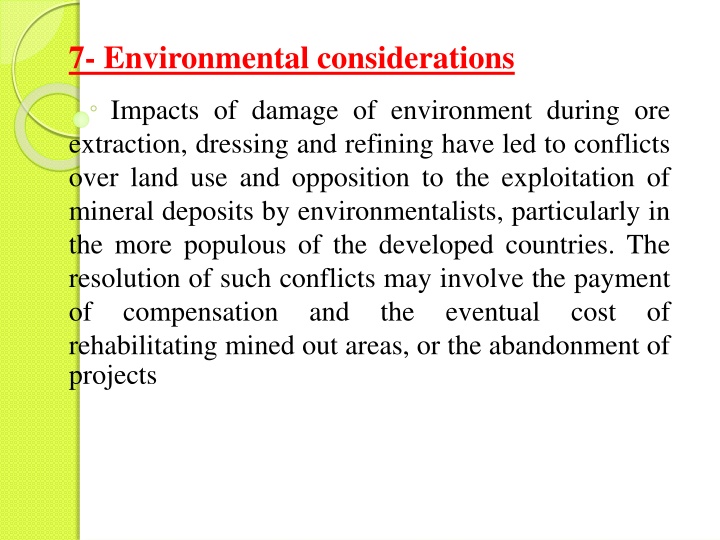
Impacts of Mineral Extraction and Taxation on Mining Industry
Learn about the environmental impacts of ore extraction and mineral refining, taxation issues in the mining industry, political factors affecting investments, and commodity price dynamics. Explore how conflicts over land use and environmental damage are addressed, the role of taxation in mining profitability, political considerations in nationalization, and market mechanisms influencing commodity prices.
Download Presentation

Please find below an Image/Link to download the presentation.
The content on the website is provided AS IS for your information and personal use only. It may not be sold, licensed, or shared on other websites without obtaining consent from the author. If you encounter any issues during the download, it is possible that the publisher has removed the file from their server.
You are allowed to download the files provided on this website for personal or commercial use, subject to the condition that they are used lawfully. All files are the property of their respective owners.
The content on the website is provided AS IS for your information and personal use only. It may not be sold, licensed, or shared on other websites without obtaining consent from the author.
E N D
Presentation Transcript
7- Environmental considerations Impacts of damage of environment during ore extraction, dressing and refining have led to conflicts over land use and opposition to the exploitation of mineral deposits by environmentalists, particularly in the more populous of the developed countries. The resolution of such conflicts may involve the payment of compensation and rehabilitating mined out areas, or the abandonment of projects the eventual cost of
8- Taxation Greedy governments may demand so much tax that mining companies cannot make a reasonable profit. On the other hand, some governments have encouraged mineral development incentives, such as a waiver on tax during the early years of a mining operation. This proved to be a great attraction to mining companies in the Irish Republic in the 1960s and brought considerable economic gains to that country. with taxation
9- Political/factors Many large mining houses will not now invest in nationalization with perhaps very inadequate or even no compensation is perhaps the main factor. Nations with a history of nationalization generally have poorly developed mining industries. Possible political problems, civil strife and currency controls may all combine to increase greatly the financial risks of investing in certain countries.
10- Commodity prices-the market mechanism Most mineral trading takes place within the market economies of the non-communist world and the prices of minerals or mineral products are governed by the factors of supply and demand. If consumers want more of a mineral product than is being supplied at the current price, this is indicated by their 'bidding up' the price, thus increasing the profits of companies supplying that product. On the other hand if consumers do not want a particular product its price falls, producers make a loss and resources leave the industry.
